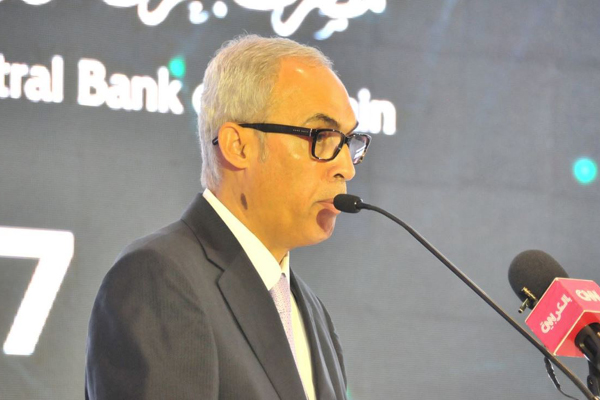
Al Maraj delivering his keynote address at the WIBC in Manama.
Islamic banking assets set for 5pc growth, says CBB chief
MANAMA, December 5, 2017
The Islamic banks' asset growth has slowed from the historical level of 14 to 15 per cent and is set to grow at around 5 per cent for the next couple of years amid the economic slowdown experienced by the GCC countries, said a top official.
However, the number of Islamic banks has grown to around 172 with another 83 or so Islamic Windows within conventional banks, remarked Central Bank of Bahrain (CBB) Governor Rasheed Al Maraj while delivering his keynote address at the opening of the 24th edition of the World Islamic Banking Conference (WIBC).
The largest and most prestigious gathering of Islamic banking and finance leaders in the world, WIBC is being held under the patronage of HRH Prince Khalifa bin Salman Al Khalifa, the Prime Minister of Bahrain.
Convened by Middle East Global Advisors - a leading financial intelligence platform facilitating the development of knowledge-based economies and in strategic partnership with the Central Bank of Bahrain, the three-day forum will run until December 6 at ART Rotana Hotel, Amwaj Islands.
The conference this year is being held under the theme – Strengthening and Developing the Islamic Economy.
Addressing the gathering, Al Maraj said in 2017 year to date there has been a global issuance of Islamic bonds (sukuks) worth $22 billion, which is a record for Islamic Banking.
Not only the demand remained strong but the geographic investor base has also become wider with a surge in demand from US investors in the case of a recent sovereign issue, he added.
According to the IFSB, the industry now employs more than 380,000 people worldwide, which reflects a significant level of economic activity by any measure.
"The other interesting feature to emerge in this region has been pricing for sukuks, which has been tighter than bonds. This is unlike pricing for sukuks, which we have seen coming from other regions where it has been the opposite," pointed out Al Maraj.
"This underscores pockets of liquidity in the region among Islamic Investors against a dearth of quality assets," he stated.
Against this backdrop, therefore it should come as no surprise that new sovereign issuers like Egypt and Jordan are reportedly also looking to tap the international market through sukuk issuances, he added.
The CBB Governor said 2018 promises to be another record year with almost $40 billion of sukuks maturing next year and almost a fourth of this maturing in the first quarter itself.
Dubbing the commodity Morabaha as the workhorse for all Islamic banking transactions, Al Maraj said: "As we all know, this product has caught the attention of sharia scholars and critics alike who question the veracity and true nature of this time-tested product. This would be a good time to explore alternatives and develop them further."
"The Wakala product has found a lot of popularity and acceptance among Islamic market players for liability products, but it also has its share of challenges, which need to be analyzed and assessed," he added.
Al Maraj pointed out that as far as transferability and secondary market activity was concerned, there was no other asset class, which ranked above sukuks in the market place.
"As we all know sukuks are considered a commodity class, which can provide the foundation for quite a few commodity morabaha products. The only constraint to this is the attendant price-risk, one would face using sukuks as an inventory of alternative commodities. This price risk can be mitigated using top credit quality issuances in the Investment Grade arena and relying on shorter maturities," he observed.
"While I accept that there are not too many Triple “A” issuers in the Islamic banking arena, and shorter maturities of their sukuks are hard to come by, the industry has the right capital market tools and derivative hedging products available to mitigate these risks," stated the CBB Governor.
"This undoubtedly would not only reduce the reliance on commodities for morabahas but it would also go a long way in addressing the Basel liquidity requirements," he noted.
On the recent issuance by AAOIFI of FAS 30 (Islamic equivalent of IFSR 9) and the publication of the sharia governance module by the CBB for implementation by mid-2018, Al Maraj said: "These two important developments, we hope will provide a solid foundation for strengthening and developing the Islamic banking industry going forward."
"As I had said at last year's conference, given the faith-based nature of Islamic banking, it is critical for Islamic banks to adopt a robust shari’ah governance framework," noted the top banking expert.
"The responsibility falls on the board of directors and senior management of Islamic banks to comply with the letter and spirit of Shari’ah and build an unmatched reputation for ethical banking," he added.-TradeArabia News Service








